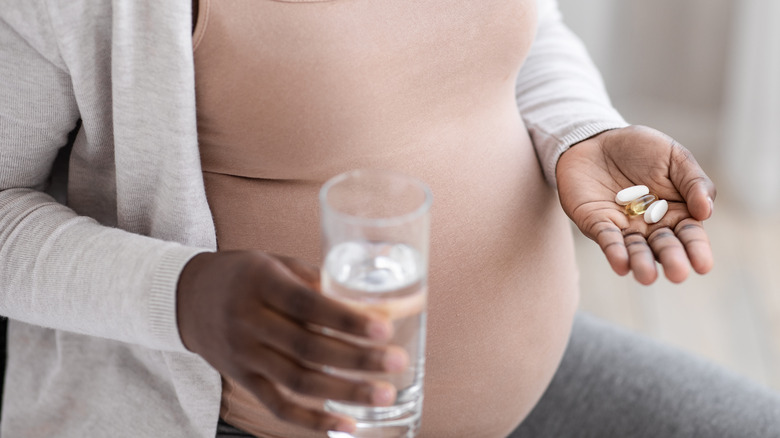The Best Ways To Prepare For Your Body For IVF
Whether you're just now considering in vitro fertilization (IVF) after consulting with your fertility specialist or you've already made the appointment to begin the process, it's a great idea to dig into what IVF entails. It's not an easy process, and as you put your body through major changes, your mental health may be affected as well, so learning how you can prepare your body for IVF and the road ahead is a great starting point.
IVF is the most successful assisted reproductive process in which eggs are collected from the ovaries and taken to a lab where they're fertilized by sperm (sometimes the sperm comes from a partner and other times from a donor). The embryos are then moved either back into the uterus or into the uterus of a gestational carrier (Via Mayo Clinic). In short, it's an invasive, expensive procedure that holds no guarantees — but it has the potential to change lives, making the entire process incredibly rewarding when it produces the desired results.
Preparing your body (and mind) beforehand will help you get into a healthy routine, which is ideal to start early as you'll likely need to stick it out throughout the course of pregnancy. It can also prevent complications from arising during IVF and pregnancy, as well as increase your odds of live birth and producing a happy, healthy baby.
Educate yourself on what's to come
Learning about what your body is about to go through can ease your nerves around IVF and make the process much less scary. Of course, it can also send you into panic mode. That's why, when you read up on everything there is to know about IVF, it needs to consist of more than just online forums and YouTubers' first-person stories. Your specialist should outline every aspect of the IVF process, but be sure to also speak with them about any of the concerns you might have, asking every question that comes to mind — there are no dumb questions; you can assume they've heard them all. Your specialists are experts in the field, and that's what they're there for.
Additionally, there are countless resources you can turn to (such as Resolve: The National Infertility Association) for information, advice, and support groups. Because IVF is used for numerous reasons, a support group is a great place to find people that may have turned to IVF for the same reasons as you, like infertility, concerts around genetic predisposition, and members of the LGBTQIA+ community who are unable to conceive naturally. Going through the process can be scary enough as it is, so don't go in blind. Looking through resources with your partner and building up your support network will be key as you prepare your body and undergo IVF treatment.
Start eating a nutritional, balanced diet
A study from 2018 has suggested that your food can directly correlate to your fertility levels. Yes, you can still eat your Cheetos and ice cream, but moderation, balance, and eating regularly are the building blocks to incorporating a nutritional diet into your day-to-day life. As you prepare for IVF treatment, eating fertility-friendly foods can increase your chances of conceiving, and continuing your nutritional diet throughout pregnancy will help your baby get the nutrients it needs to develop, too.
In the same study, a Mediterranean-style diet is heavily recommended because it can boost your reproductivity, as well as your mood and overall wellness. A Mediterranean diet consists of lots of fruits and vegetables, whole grains, fish, and healthy fats while limiting your intake of red meats and sugar. If your partner is the embryo's sperm provider, it might be a good idea for them to follow these eating habits, too, as it can lead to a higher sperm count.
Obviously, nobody wants to go on a diet, but it doesn't have to be a chore. Changing your eating habits as a couple can inspire some cute and fun date nights in the kitchen, cooking up new recipes together. If you've needed an excuse to try a new restaurant or cuisine, you've just found it.
Take prenatal vitamins
That's right, even before you're pregnant. It's usually considered good practice to take a multivitamin daily, regardless of your intentions to conceive. But, when you need to start taking your physical well-being more seriously, prenatal vitamins can provide a mountain of benefits, especially as you prepare for IVF. (There's even a version for men to help with sperm count!) Specialists recommend you take your prenatal vitamins six months before your first cycle of IVF to give your body the immunity boost it will need when it comes time to conceive (via Fertility Associates of Memphis). If the clock is counting down to your IVF appointment, don't panic. Starting now is better than not taking them at all.
Prenatal vitamins can provide antioxidants, promote healthy hormones, improve egg health, and help protect your baby from developing birth defects. The ideal ingredients your prenatal vitamin should include are folic acid, iron, omega-3 fatty acid, and vitamin D (via OC Fertility). Depending on your age or other health factors, your doctor may advise you to take different or additional supplements, which is why communicating thoroughly with your specialist at this time is so important.
Get plenty of sleep (but not too much)
Your body needs to be strong and well-rested to undergo the IVF journey, and the best way to get there is by getting the right amount of rest. While more research is still needed to determine the exact correlation between sleep and fertility, one study concluded that between seven and eight hours of sleep a night is deemed optimal for women undergoing IVF treatment (via HuffPost). Getting adequate sleep can help boost your reproductive hormones and reduce stress — something that has been strongly linked to fertility and menstrual issues, as well as miscarriages.
Surprisingly, the same study also noted that too much sleep may actually be harmful to your reproductive health as well, with links to fertility and menstrual cycle changes. This might be a little incentive to not sleep until noon, but with the addition of hormones fueling your mood changes, sleeping the right amount as you begin IVF treatment may prove challenging. That's why getting yourself into a solid routine now can help you maintain a healthy sleep cycle later on.
Ultimately, you know your body best and the amount of sleep you need to feel recharged and stress-free, and your very best is between you and your pillow. If you struggle to sleep already, try deep breathing exercises, switch off your screens an hour before bed, read a book, or drink herbal tea to switch your brain into sleep mode.
Break up with your unhealthy habits
Smoking and drinking are obvious no-nos when pregnant, but this condition extends to the time you're trying to conceive. Aside from the health risks already associated with smoking, a 2018 study has shown smokers with endometrial thinning. Particularly for assisted reproduction therapy patients, this can lead to many issues like failed implantation and decreased chances of live birth — regardless of the number smoked. If you're still trying to kick the habit, it may be worth discussing postponing your IVF treatment with your doctor, as the same study claims smoking while pregnant can also cause serious birth defects, ectopic pregnancies, and miscarriages.
Drinking alcohol has been a debated topic for many years, in terms of the adverse effects it can have when trying to conceive and during pregnancy. There are some who still think "just an occasional glass of red wine" will bring antioxidant benefits that outweigh the potential dangers, but it's now been determined that no amount of alcohol is safe to drink while pregnant. This extends to those going through IVF as well, as a 2011 study has linked drinking to ovulation disorders and a 48% higher risk of failed implantation. Why risk it? Your body will need to be in the best possible shape for your treatments and, in the future, pregnancy. All of the stress of planning and preparing will probably make you want to reach for a drink, but a virgin cocktail will have to do for a while.
Reduce your caffeine addiction
The jury is still out on whether caffeine directly inhibits your fertility. Many studies have concluded that alcohol has a much greater impact on IVF treatment than caffeine, and less than 200 to 300 milligrams of coffee a day is probably okay for women trying to conceive, but any more may be a bad idea. Caffeine is a stimulant that can increase your blood pressure, disrupt sleep, and alter your reproductive hormones when consumed in large quantities (via Healthline). Treatments can put your body and mind in a very fragile place, so adding a bunch of coffee into the mix probably isn't the best idea.
For those who can't open their eyes before their morning cup of joe or are sipping on Starbucks throughout the day, cutting down your coffee intake might be hard. But doing it now will get you over the caffeine headaches and other withdrawal symptoms ahead of time because it's really not something you'll want to deal with while going through IVF. Retraining your body to live with less (or no) caffeine might leave you groggy for the first week or two, but with simple changes like switching to decaf, tea, or taking a cold shower in the morning, it'll become easier. Ultimately, your caffeine consumption is your choice, but moderation is key.
Take up activities that minimize your stress
IVF treatments bring changing hormones, which can give you hot flashes, headaches, nausea, bloating, and moodiness (via Aspire Fertility). This can be stressful enough, but juggling the expenses of treatment, the planning involved, and all of the responsibilities in your life, you're definitely going to be more prone to stress. Unfortunately, worrying will only make matters worse, as stress has been linked to failed implantation and fertility complications (via Boston IVF).
Finding ways to combat your stress and anxiety before you undergo IVF treatment may make the entire process more manageable and give you a higher likelihood of success. Some techniques like practicing meditation, mindfulness, journaling, joining a support group, or utilizing a creative outlet like art or music can have a huge impact on your stress levels and help you to cope. Finding professional help is also highly encouraged because a therapist can provide mental health support and be a fantastic outlet for your general concerns or hardships (IVF-related or not). Additionally, planning your routines can help you figure out what will aid your mental well-being throughout pregnancy, parenthood, and onward.
Get active to boost your blood flow
Regular exercise is already a highly recommended way to stay healthy and in shape, and you probably hear it all the time. But it's also a fantastic way to improve your mood, sleep, cognition, and overall quality of life (via CDC). Oddly, there's a lot of conflicting advice out there for IVF patients; do you take it easy or push yourself harder? Light exercise before and during your IVF treatment can improve blood flow, increasing your chances of successful implantation. It's recommended you opt for low-impact exercises, like yoga, as it's easier on your body and can improve your flexibility, diminish stress, and help you cope mentally if your IVF cycle fails (an unfortunate but very real possibility you will need to prepare for).
However, a 2006 study has linked over-exercising to consequential outcomes during the IVF process. In the study, those who exercised more than four hours a week saw more issues while undergoing IVF, including failed implantation or miscarriage. As you decide your activity levels, be kind to yourself and start small, aiming for around 30 minutes a day of brisk walking or stretching. Essentially, how much you exercise is up to you; listening to and respecting your body's signals will be something you'll have a lot of practice in by the end of the IVF process, and it's something you can start working on now.
Relax with a massage or acupuncture
This is probably one way to prepare your body for IVF that everyone can get on board with. Getting a massage or acupuncture treatment before you begin the IVF process isn't just a great way to ease the tension. Among IVF patients, these treatments have also led to higher success rates due to increased blood flow and relaxation. These treatments have proven the most effective when done on the day before and the day of the embryo transfer, according to a 2019 study.
While acupuncture is a more traditional therapeutic treatment recommended to many IVF patients, the needles can be off-putting for some. A study from 2015 determined that women receiving deep relaxation massages saw high success rates in transfers and live birth rates, most likely due to the relaxation that can prevent your abdominal muscles from cramping up. So, luckily you have more than one destressing option to choose from. If you're itching for some relief after all the hard work you've been putting in, you can justify booking the appointment for yourself — and maybe throw in a facial while you're at it.
Try not to get sick
No, you don't have to quarantine yourself away in your house (we've done enough of that in recent years). But, contracting anything more serious than a common cold may result in a temporary postponement of your IVF treatment, depending on what stage you're in and the severity of your symptoms (via UNC Fertility). A fever or stomach bug can throw off your cycle and perhaps make your body believe it's not well enough to become pregnant at that time. Planning for a family is stressful enough, so aside from the annoyance of rescheduling your IVF appointment, an illness would be an unwelcome surprise to your body and stress levels at this time.
This is sometimes unavoidable, especially when flu season comes around, but there are always preventative measures you can take, like washing your hands, avoiding unnecessary travel, getting plenty of immune system-boosting vitamins in your system, and staying up to date on your flu shot. Also, if you want to be extra careful, there's probably still an abundance of facemasks lying in one of your drawers somewhere — COVID may not be as much of a concern as it used to be, but putting your health first right now is what matters most.
Create a self-care routine
Preparing your body for IVF will be a lot of work, but keeping in mind how it will all be worth it, in the end, can keep your motivation going. One of the best ways to do this is by creating a self-care routine, which will be a constant reminder to be nice to yourself; after all, you're undergoing quite a transformation. Whatever your self-care routine entails will be up to you, but ideally, it will consist of regular time to relax, buy a treat for yourself, and have fun.
It would be great if assisted reproductive processes were all sunshine and rainbows, but life-altering growth doesn't come easy. So much so that patients have reported IVF treatments as stressful as other major life events, including divorce or a death in the family (via Premier Health). The process will probably be emotionally draining, but don't let this get you down; use it as motivation to build a consistent routine for yourself, full of things that make you feel good. Take a hot shower every day, go to your favorite bakery once a week, or get a pedicure once a month, and reward yourself for being so strong.











